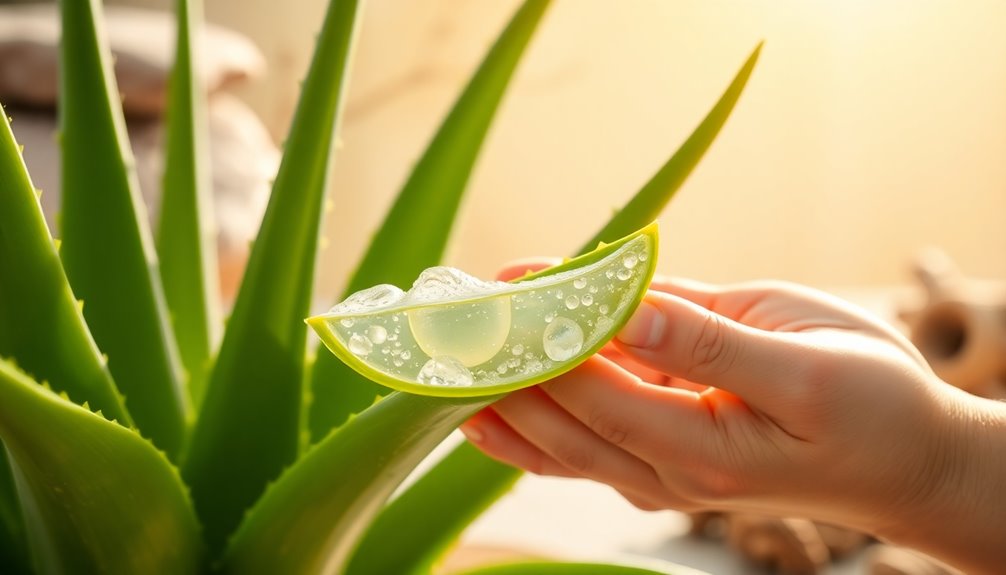Aloe vera offers incredible benefits for your skin, hair, and digestive health. With over 75 active ingredients, it helps heal wounds, soothe burns, and reduces acne due to its antibacterial properties. It's also a natural laxative that aids digestion and can lower blood sugar levels. Plus, its moisturizing qualities improve skin hydration and elasticity. If you're curious about how aloe vera can enhance your well-being even further, there's plenty more to discover!
Key Takeaways
- Aloe vera promotes faster skin healing and reduces inflammation, making it ideal for treating burns and wounds.
- Its antibacterial properties help combat acne and improve overall skin health.
- Aloe vera aids digestion and can relieve constipation while supporting gut health.
- The plant's natural moisturizing effects enhance skin hydration and elasticity, promoting youthful skin.
- Aloe vera can improve oral health by reducing plaque and gingivitis, serving as a natural mouthwash alternative.
Overview of Aloe Vera

Aloe vera, often hailed as a miracle plant, is packed with over 75 active ingredients that make it a powerful natural healer. This medicinal plant, with its thick, fleshy green leaves, thrives in hot climates like California and the Caribbean.
It's renowned for its health benefits, particularly in wound healing and treating skin conditions. Historically, aloe vera has been used to soothe burns and promote skin recovery.
Additionally, research suggests that aloe vera juice may aid in managing conditions such as inflammatory bowel syndrome (IBS), diabetes, and heartburn.
With a global market value of about $13 billion, the demand for aloe vera continues to grow as people seek natural remedies for their health concerns.
Aloe Vera Benefits and Nutrition

Packed with essential nutrients and health benefits, aloe vera can be a great addition to your wellness routine. It is known to aid digestion, boost the immune system, and provide hydration, making it an ideal choice for those seeking to enhance their overall health. Many people are increasingly exploring aloe vera health benefits for drinking, as incorporating it into smoothies or juices allows them to enjoy its remarkable properties in a delicious way.
The aloe vera gel is renowned for its ability to help heal skin issues, reduce swelling, and soothe irritation. With its antibacterial properties, it can also protect your skin from infections.
Additionally, consuming aloe vera juice offers a low-calorie option that provides crucial minerals like calcium and potassium, along with amino acids that support overall health.
Remarkably, this plant may even help lower blood sugar levels, making it a beneficial choice for those monitoring their glucose.
Plus, its natural laxative effects can effectively treat constipation when consumed thoughtfully.
Embrace aloe vera for a nutritious boost to your health!
Healing Properties of Aloe Vera

When you think about healing, aloe vera should be at the top of your list.
Its powerful skin healing abilities and antibacterial properties make it an essential natural remedy for cuts, burns, and other injuries.
You'll find that using aloe vera can speed up recovery and protect your skin from infections.
Skin Healing Abilities
Known for its remarkable skin healing abilities, aloe vera stands out as a natural remedy that promotes faster recovery of damaged skin. This powerful plant contains polysaccharides that enhance cell communication, helping to heal wounds effectively. Its topical gel not only soothes irritation but also reduces inflammation, making it ideal for various skin conditions like acne and sunburn. Studies show that aloe vera can shorten burn healing time by about nine days compared to traditional treatments.
| Skin Condition | Healing Effect | Application Method |
|---|---|---|
| Burns | Reduces healing time | Apply topical gel |
| Acne | Soothes irritation | Apply directly |
| Sunburn | Reduces redness | Use cooling gel |
Antibacterial Properties
Aloe vera not only excels in skin healing but also boasts impressive antibacterial properties. Its high content of polyphenols inhibits the growth of bacteria, making it a powerful ally in skin care.
The gel's antiseptic qualities help treat wounds and burns, allowing your skin to heal faster—often reducing healing time by about nine days compared to conventional treatments. Additionally, aloe vera effectively combats Candida albicans, a yeast that can cause oral infections, promoting better oral health.
The recognition of aloe vera as a skin protectant since the 1810s underscores its longstanding use as a natural antibacterial agent. By incorporating aloe vera into your routine, you can harness these antibacterial benefits for overall wellness.
Aloe Vera for Skin and Hair Care
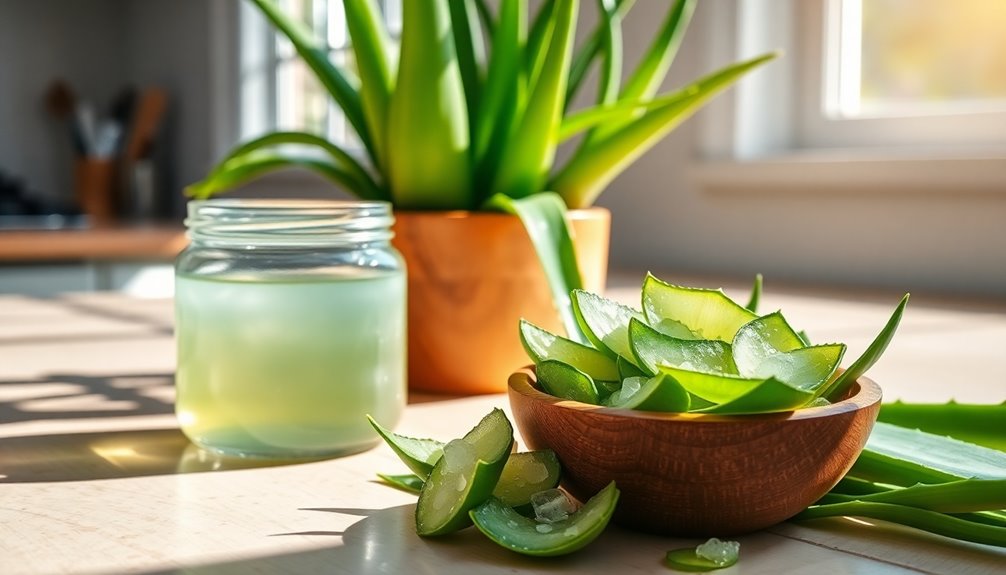
While many people seek out natural remedies for skin and hair care, few ingredients rival the benefits of aloe vera. Its moisturizing properties can greatly improve skin hydration and elasticity, giving you a more youthful appearance.
When applied topically, aloe vera gel soothes sunburned skin and reduces redness and inflammation thanks to its antibacterial properties, making it an effective treatment for acne.
For your hair, aloe vera helps remove dead skin cells from the scalp, creating a healthier environment for hair growth while strengthening strands and reducing breakage.
Incorporating aloe vera into your routine not only enhances your overall skin health but also promotes luscious, vibrant hair. Embrace this natural healer for radiant skin and hair!
Digestive Health Benefits
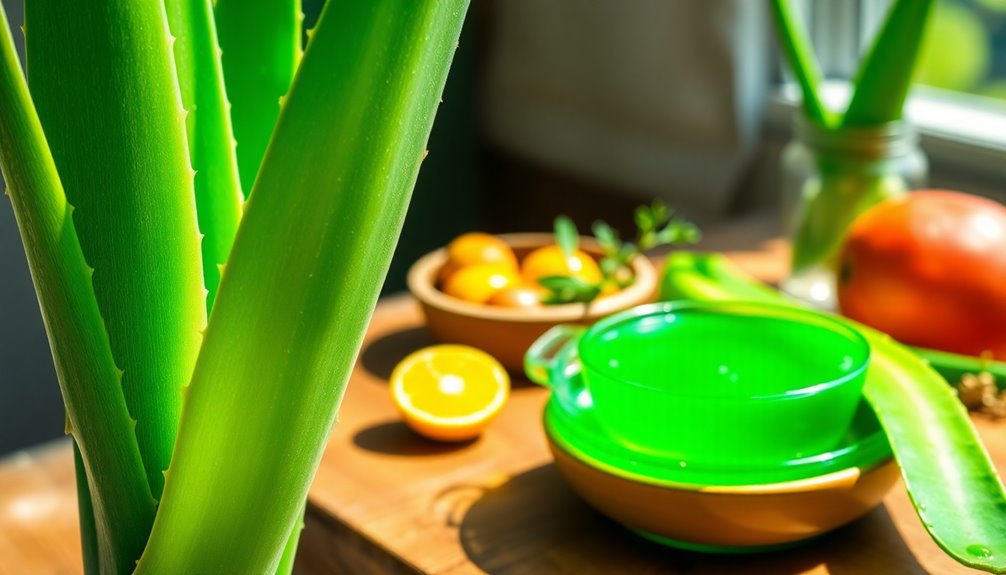
After harnessing the skin and hair care benefits of aloe vera, you'll find that this remarkable plant also offers significant advantages for digestive health. Aloe vera is known for supporting gut health by aiding recovery from digestive issues like acid reflux and ulcers. Its compounds soothe irritation in the digestive system, helping with gastrointestinal disorders, including inflammatory bowel diseases such as Ulcerative Colitis and Crohn's disease. Drinking aloe vera juice can also help with constipation due to its natural laxative properties. Regular intake may enhance gut function and promote regularity.
| Benefit | Description | Key Component |
|---|---|---|
| Reducing Inflammation | Alleviates symptoms of digestive issues | Anti-inflammatory compounds |
| Supports Gut Health | Aids recovery from gastrointestinal disorders | Aloe vera juice |
| Soothes Digestive Tract | Eases irritation in the digestive system | Gel from aloe leaves |
| Treats Constipation | Acts as a natural laxative | Aloin |
| Promotes Regularity | Enhances overall digestive function | Quality aloe vera |
Recommended Usage and Dosage
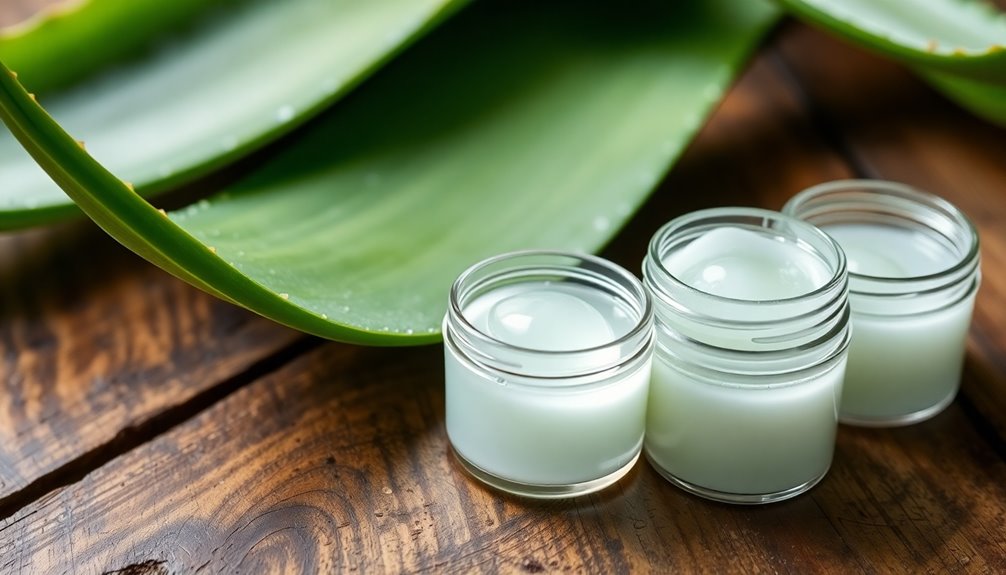
When considering the use of aloe vera, understanding the recommended dosage is essential for maximizing its benefits.
For oral aloe vera, a common suggestion is 30 milliliters of liquid juice daily. Alternatively, you can take 50 to 200 milligrams of leaf gel caps or 15 to 60 drops of tincture mixed with juice or water.
When it comes to topical aloe vera, applying the gel three to five times a day can help with skin conditions.
However, it's vital to consult your doctor before using aloe, especially in large amounts, as high doses of aloe latex can lead to serious side effects.
Pregnant women, breastfeeding mothers, and children under 12 should also seek professional advice before using aloe vera.
Risks and Side Effects

Although aloe vera offers several benefits, it's important to be aware of the potential risks and side effects associated with its use.
Topically, aloe vera is generally safe, but you might experience skin irritation or hives.
If you consider the oral intake of aloe vera, be cautious; it can cause cramps, diarrhea, vomiting, and low potassium levels. High doses of aloe latex can lead to serious complications like belly pain, kidney damage, and electrolyte imbalance.
Pregnant or breastfeeding women, and children under 12, should avoid it. If you have allergies to garlic, onion, or tulips, you could also face allergic reactions.
Always consult a doctor before using aloe vera, especially for potential drug interactions.
Research and Studies on Aloe Vera
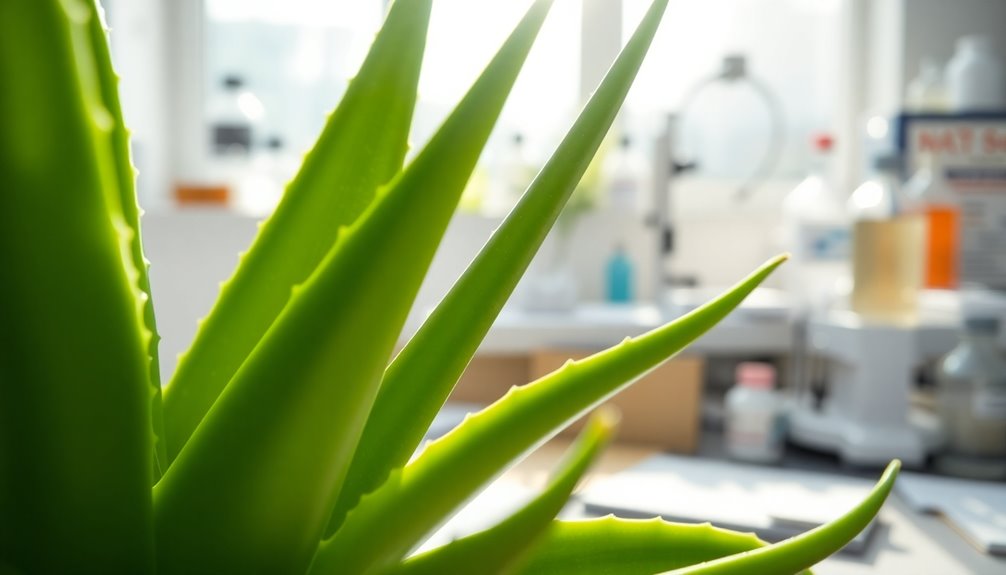
Research into aloe vera reveals its impressive range of health benefits, making it a popular choice in both traditional and modern medicine.
Systematic reviews highlight the benefits of aloe vera in managing type 2 diabetes by improving insulin sensitivity and supporting glycemic control.
Clinical evidence also supports its use in treating digestive issues, with studies showing it may alleviate symptoms of ulcerative colitis and Crohn's disease.
Moreover, research on aloe suggests it can reduce burn healing time by about nine days compared to conventional treatments, proving its effectiveness in wound healing.
Additionally, studies indicate that aloe vera mouthwash can notably decrease plaque and gingivitis in children, showcasing its potential as a natural oral health alternative.
Furthermore, aloe vera's anti-inflammatory properties may enhance its effectiveness in pain management, similar to how turmeric is utilized.
Personal Experience With Aloe Vera
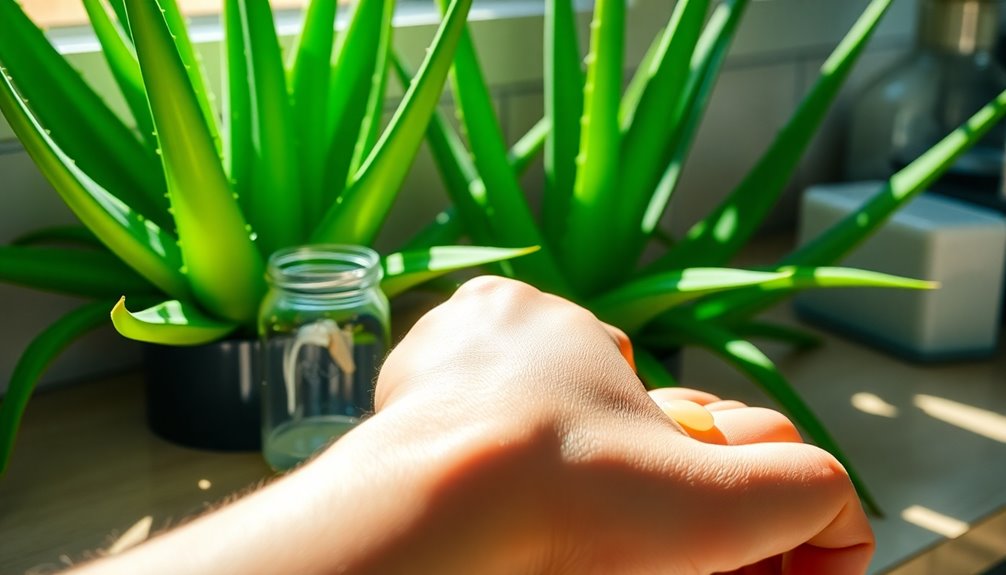
After a cycling accident left me with road rash, I turned to aloe vera for healing and saw impressive results.
Its cooling effect eased my pain, while its natural antibacterial properties helped prevent infections.
You might even consider adding aloe vera to your daily routine, like blending it into smoothies for an extra health boost.
Healing After Injuries
Many people have found aloe vera to be a game changer when it comes to healing after injuries. Its antibacterial properties help prevent infections, making it an effective natural healer for cuts and abrasions.
When you apply aloe vera gel to your skin, you'll likely notice soothing relief that accelerates healing, especially for conditions like road rash. Studies show it can reduce burn healing time by about 9 days compared to traditional treatments.
Plus, aloe vera's polysaccharides enhance cell communication, promoting faster recovery. Its moisturizing qualities not only soothe irritated skin but also improve hydration, aiding overall recovery after injuries.
Incorporating aloe vera into your healing routine can truly make a difference, as it works synergistically with essential oils for wound healing to enhance the overall healing process.
Daily Health Incorporation
Aloe vera isn't just a remedy for injuries; it can also become a valuable part of your daily health routine. Incorporating aloe vera into your life can help improve skin hydration, making it an excellent natural moisturizer for your skin and hair.
You might find that using aloe vera gel topically accelerates healing for minor cuts and sunburns. Additionally, drinking aloe vera juice regularly can support digestive health, aiding in issues like acid reflux and ulcers.
Its antibacterial properties make it a great alternative to chemical mouthwashes, promoting oral health by reducing plaque and gingivitis. For the best results, consult a healthcare professional to tailor its use to your specific needs and enhance your daily wellness journey.
Frequently Asked Questions
What Are the Medicinal Benefits of Aloe Vera?
Aloe vera's medicinal benefits are impressive. You can use its gel to heal wounds and soothe burns, thanks to its antibacterial and antiseptic properties.
If you're managing blood sugar levels, aloe vera juice might help improve insulin sensitivity.
For oral health, try aloe vera mouthwash to reduce plaque and gingivitis naturally.
With over 75 active ingredients, incorporating aloe vera into your routine can enhance your wellness in various ways.
What Happens if I Take Aloe Vera Daily?
If you take aloe vera daily, you might notice improvements in digestion and gut health, which can ease issues like IBS or acid reflux.
It could also help manage blood sugar levels and enhance insulin sensitivity if you have type 2 diabetes.
Additionally, you may experience better skin hydration and reduced signs of aging due to its antioxidants.
However, be cautious—excessive intake might cause cramping or diarrhea, so moderation is key.
What Is the Healing Power of Aloe Vera?
Aloe vera's healing power lies in its unique compounds that speed up the recovery of skin and tissues.
You might think it's just a plant, but its polysaccharides improve cell communication, promoting faster healing for cuts and burns.
Its antioxidants fight infections and reduce inflammation, making it perfect for soothing skin irritations.
Whether you're dealing with sunburn or minor wounds, aloe vera's natural properties offer effective relief and support for your body's healing process.
How Fast Does Aloe Vera Speed up Healing?
Aloe vera can speed up healing considerably. When you apply its gel to wounds or sunburn, you might notice a reduction in healing time by about nine days compared to traditional treatments.
The polysaccharides in aloe vera enhance cell communication, promoting faster regeneration of skin. Additionally, its antibacterial properties help prevent infections, ensuring your injuries stay clean.
Conclusion
So, if you thought aloe vera was just a fancy plant for your windowsill, think again! It's practically the Swiss Army knife of nature—soothing burns, hydrating skin, and even calming your stomach woes. Who needs expensive creams or fancy supplements when you've got this green miracle in your corner? Just remember, while it works wonders, don't go overboard—after all, we're not trying to create a new aloe vera horror story! Embrace the healing, but keep it real!
Cindy thoroughly researches juicing trends, techniques, and recipes to provide readers with practical advice and inspiration. Her writing style is accessible, engaging, and designed to make complex concepts easy to understand. Cindy’s dedication to promoting the advantages of juicing shines through her work, empowering readers to make positive changes in their lives through the simple act of juicing.

